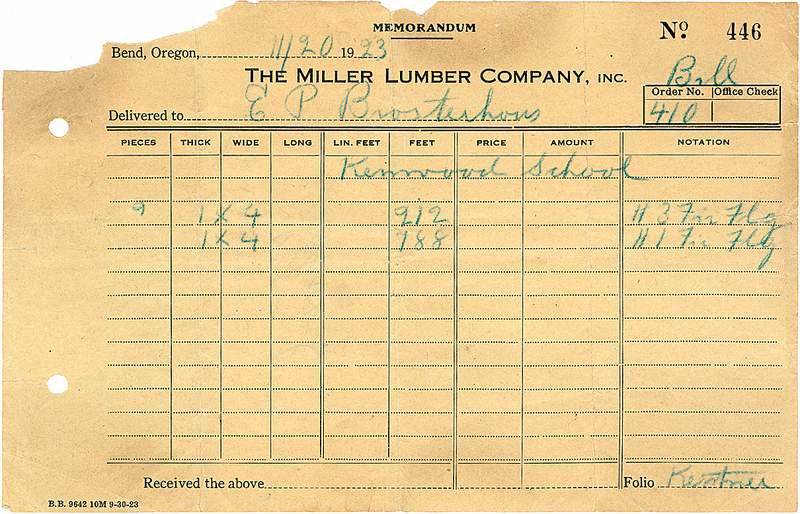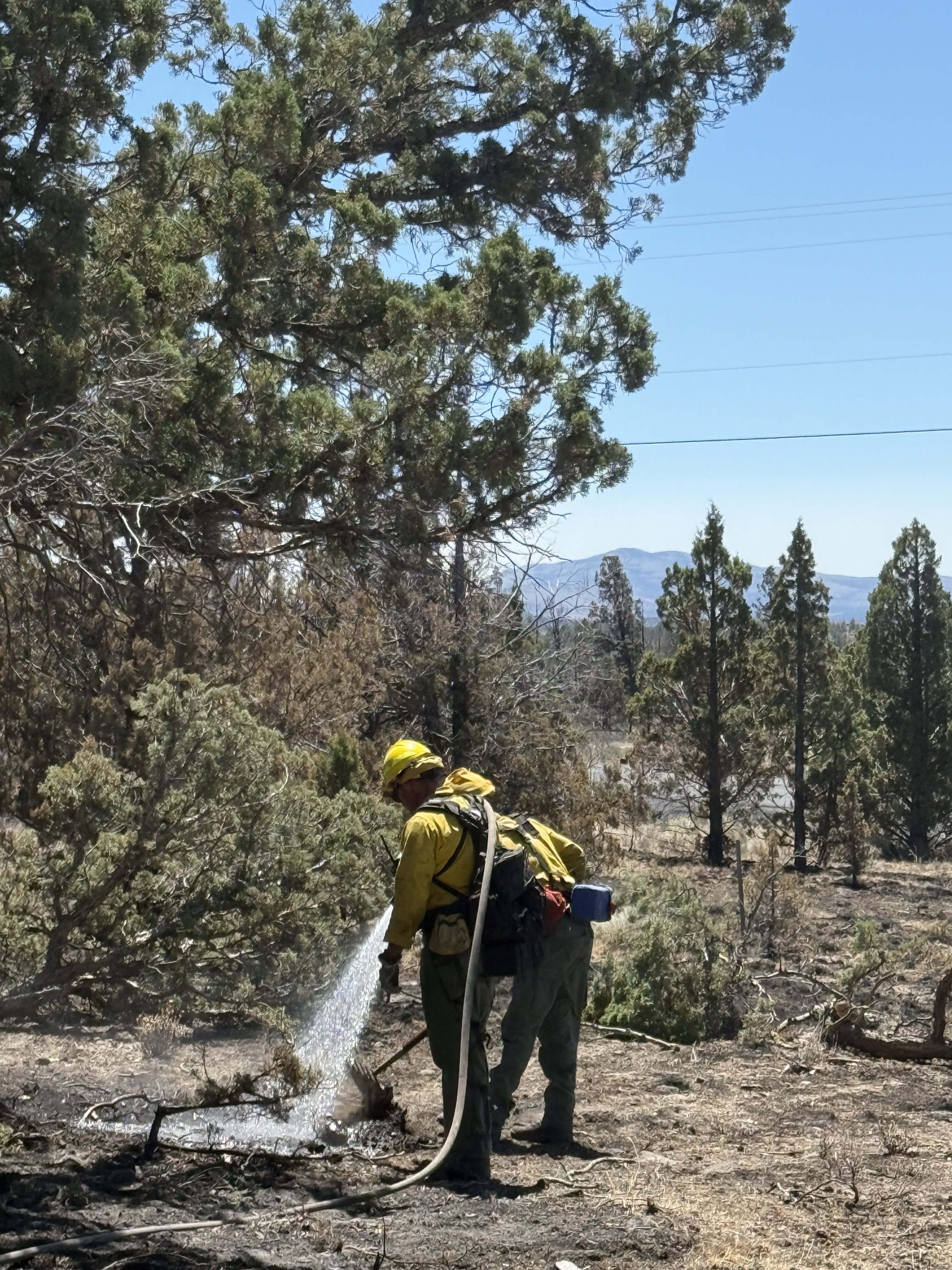A century for the Miller Lumber Co.
Published 5:00 am Sunday, March 13, 2011

- A Miller Lumber Co. invoice from November 1923 records the delivery of product to E. P. Brosterhous at the Kenwood School in Bend. Invoices such as this one were sometimes stuffed in a wall at the end of a construction project, said Charley Miller, the company's current president.Submitted photos
Miller Lumber Co. is 100 years old this month. Or is it next month? Charley Miller is not exactly sure.
Miller, president and a co-owner of the company his grandfather founded, does not keep a large history file at the company’s headquarters on Greenwood Avenue in Bend.
Trending
For him, history is not as important as the present and the future. Miller is a decidedly forward-looking person.
Not that he can’t brag about the past a bit.
“We’re the oldest (Bend company) under the same family,” Miller said Monday during a wide-ranging conversation about the company’s history in a conference room at the Bend office. Miller was rifling through what little archival material he had.
“It’s not the sexiest business,” Miller said. Still, he’s proud of his family’s achievement.
Miller Lumber Co. appears to be one of the oldest remaining businesses in Bend, having been established in 1911. It also stands out for staying in the same family. (The Bulletin, for its part, began in 1903 but did not stay in the family of founder Max Lueddemann.) It is considered a pioneer family in the city and has had a hand in many parts of its development.
Gary Vitale, president and CEO of the North American Wholesale Lumber Association, said several century-old lumber companies exist in the eastern part of the United States. “Then, as you go (farther) west, you get fewer and fewer,” he said.
Trending
Altogether, he said, “not a lot of companies reach that century mark. That’s quite a feat. … There are probably more than even we know of, but even at that, you’re talking about a very select group of individuals and families that can make a company stay viable for that long.”
He said his hat is off to the Miller family.
Bend native and historian Jim Crowell has some ideas about why the company has managed to survive as long as it has.
For one thing, Crowell said, every town needs a lumberyard. (Today, Miller has locations in Bend, Prineville, Madras and Redmond.) Also, he said it helps if a company can be around long enoughto serve the next generation of Miller Lumber customers. And he figures the company has been able to forge strong ties with mills and their salespeople, to arrange for the smartest possible business dealings.
Crowell himself is impressed with the longevity of the business. Others he recalls from his childhood — Woolworth, for instance — are gone for good.
“Businesses that you would swear would be there your entire life … haven’t been there 50 years,” he said.
Looking back
Over the past century, many aspects of the Miller Lumber Co. have changed, from products to building techniques, from leadership style to employment, Miller said.
The economy has changed multiple times, too. Wars have started and ended.
But there has always been lots of work to do.
“So you just keep grinding, I think,” he said.
Some things have been passed down and kept constant, though, he said: “involvement and investment in the community, which I think helps you survive and helps give you some meaning in why you’re surviving.”
He said his father, Bill, and grandfather, H.A., known as Ham, were both one step removed from on-the-ground goings-on, “but still very much with their finger on the pulse.”
He has preferred a more involved role as president of the company. It’s “smaller than most people might think,” he said, with 24 employees, and therefore “you don’t need a lot of organizational structure.” If anything, he said, the company is “pretty flat.”
Having spent plenty of time watching his father work at the helm, he said he was moved to keep the company running with nuance, “conservative in operations, but also looking at other things.”
In the more than 25 years he has worked there full-time, he’s made innumerable slight changes from month to month, all for the sake of keeping the business successful and responsive.
Practicality and reason, he said, have been important values in selecting products to offer at the yards.
He said he would only allow the company to sell a new product if it fits customers’ needs, make sense and functions better than the products already on the market.
As far as recessionary survival skills are concerned, Miller said he has chosen retirements and hour cutbacks over layoffs for his employees. Technological innovations have allowed the company to do more with fewer people on hand.
It helps that, in his eyes, there are bright spots in his industry. Green building has become popular, and, he said, “wood is the greenest-building material, I would say, on the Earth.”
Looking forward
At least for now, he’s not interested in running for mayor, despite the fact that both his father and his grandfather have served in that capacity.
Miller has volunteered in a different position his father and grandfather once held: president of the Bend Chamber and chair of its board. Tim Casey, its executive director, said Ham Miller was instrumental in the organization’s creation.
“The Millers have been just outstanding in helping us, supporting the Chamber,” said Casey, who became associated with the organization eight years ago and has since called on Charley Miller many times for all kinds of background information.
In the educational realm, he has followed his father, Bill Miller, in supporting higher education. His father was a founder of Central Oregon Community College and its foundation. Now Charley Miller is on the school’s board of directors.
He isn’t particularly concerned about whether any of his children would like to take the reins of the company when the time is right for him to step aside.
“You want the next generation to be doing what they want to do,” he said.
He said the company does not have an obligation to continue running, and in the family at that, especially if business declines. It’s strictly a business decision, not a sentimental one.
“There’s no great feeling of responsibility to trudge on if things become miserable,” he said. “We didn’t sign in blood.”
Turning points for Miller Lumber Co.
1910: After running a retail operation for building materials with a friend for six years and then selling his interests, H. A. “Ham” Miller moves from Hixton, Wis., to Bend. He, J. H. Overturf and Dwight Davis start a retail lumber business, the Overturf-Davis-Miller Co.
1911: Ham Miller buys his partners’ interests in the business and establishes Miller Lumber Co.
1916: Ham Miller signs an agreement with the Shevlin-Hixon Co. to conduct its Central Oregon retail and distribution work through Miller Lumber Co.
1939: The company opens a yard in Prineville.
1949: The company opens a yard in Madras, probably because of the construction of Round Butte Dam.
1962: The company opens a yard in Redmond.
1966: Ham Miller dies. His son Bill Miller takes over as company president.
1967: The company’s yard in Burns closes.
1985: Bill Miller’s son Charley becomes general manager.
1960: Miller Lumber Co. moves its office from its downtown location on Oregon Avenue to the intersection of Division Street and Greenwood Avenue.
1995: The company moves its Bend office down the street to its current location between Northeast First and Second streets on Greenwood Avenue, to make way for the Bend Parkway. A contractor for the Oregon Department of Transportation begins demolition of the Division and Greenwood building.
2001: Bill Miller dies. His son Charley becomes president and general manager.
2011: Miller Lumber Co. celebrates its 100-year anniversary.
Sources: Charley Miller, Deschutes County Historical Society, Bulletin archives








